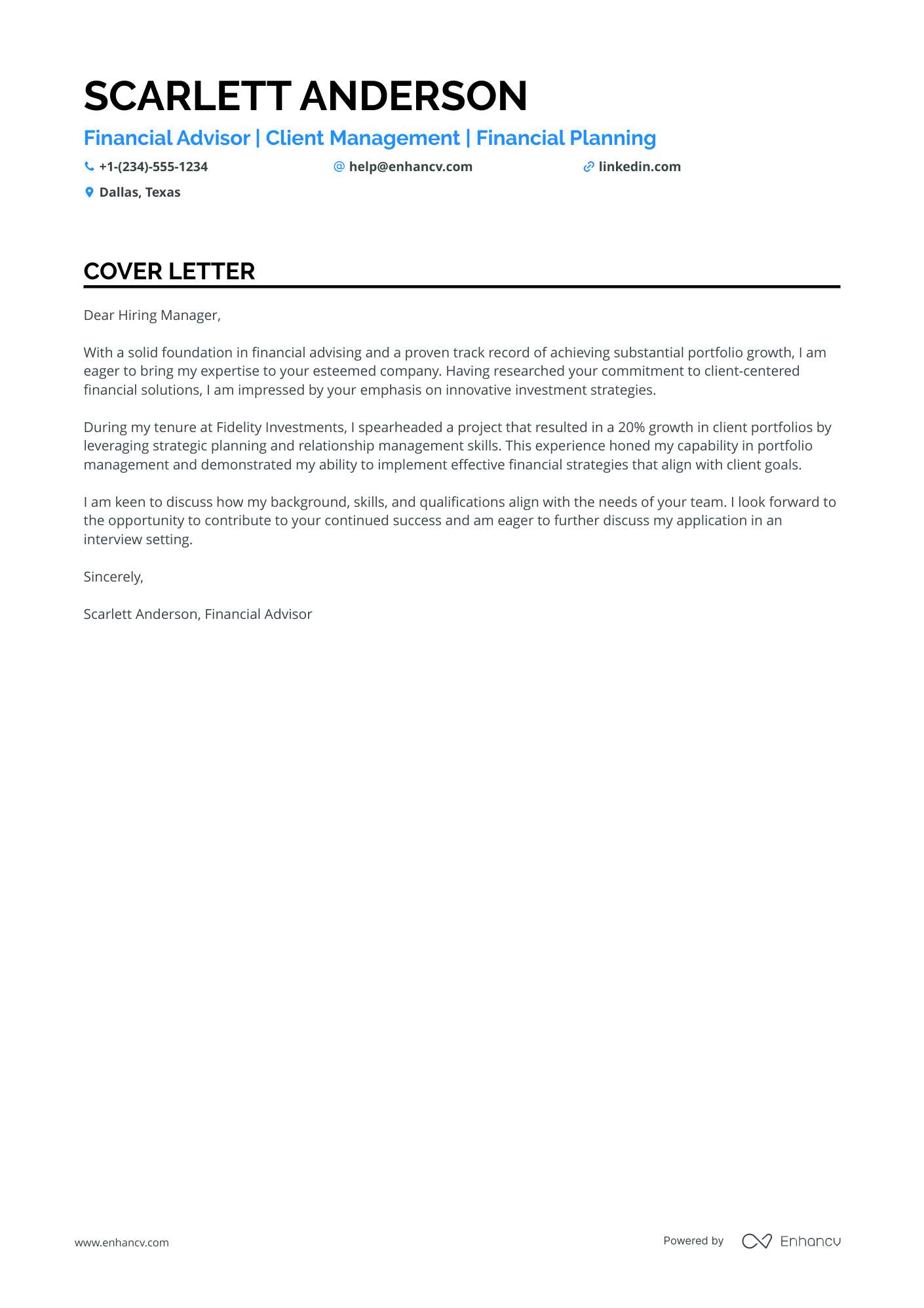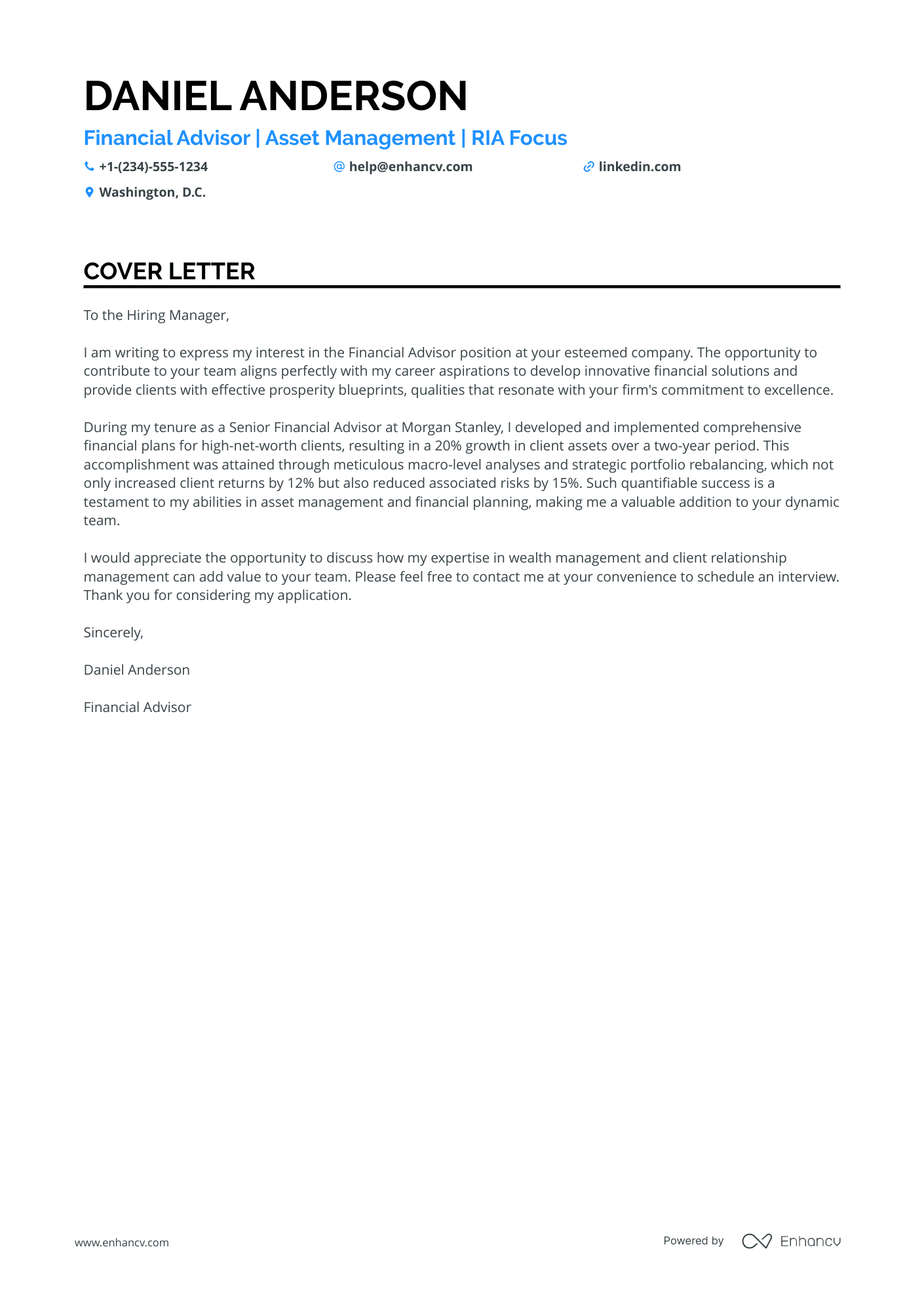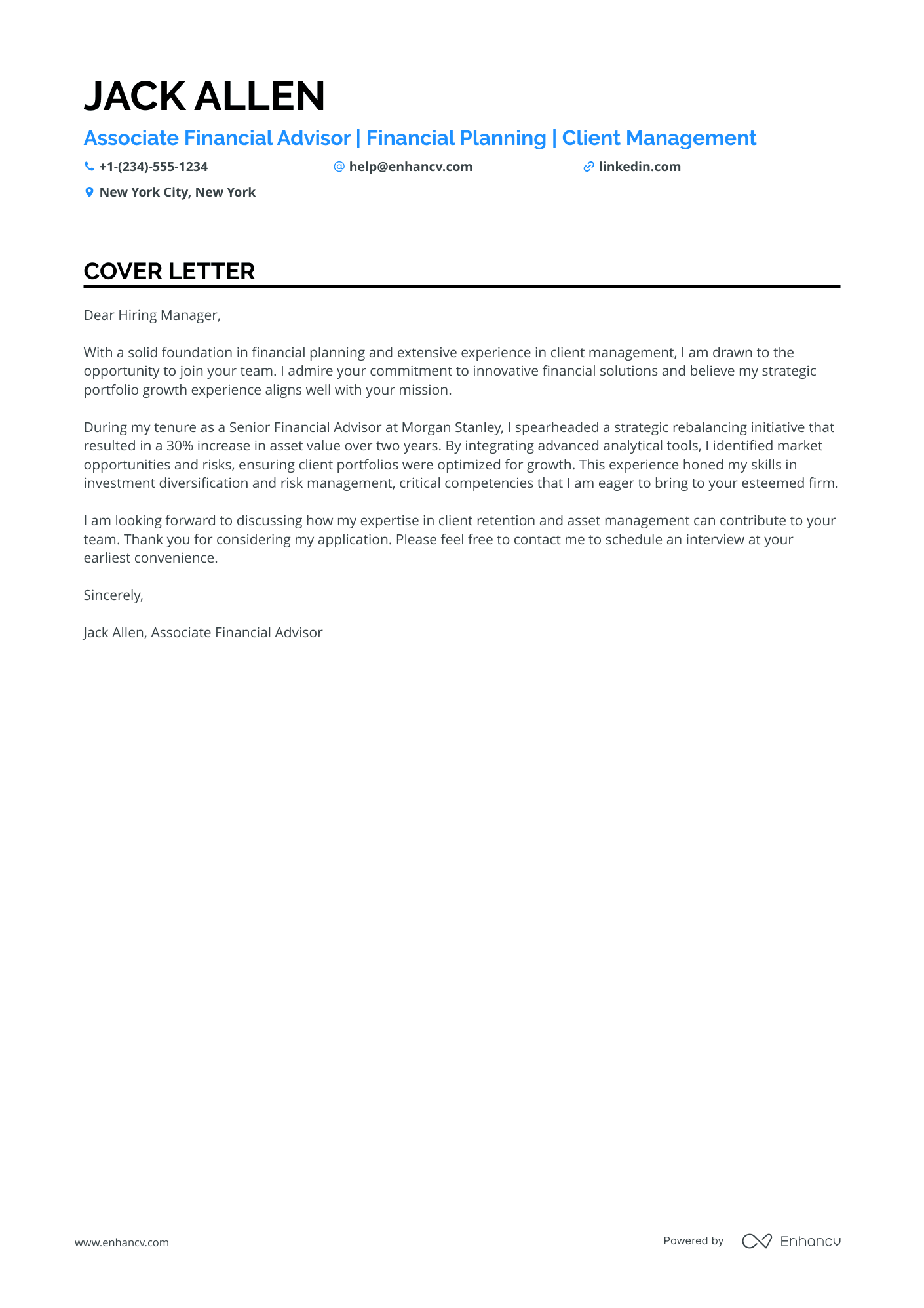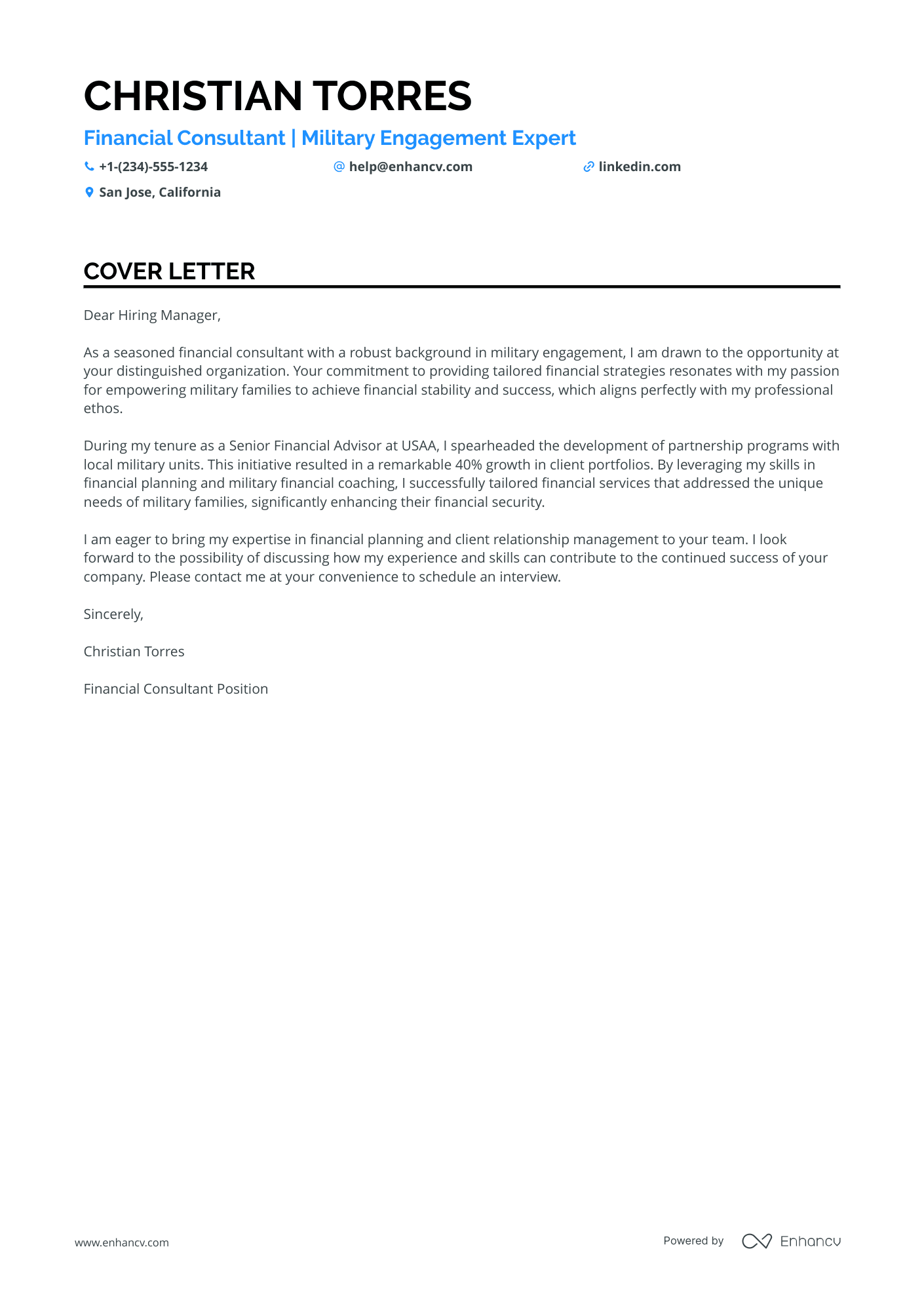Crafting a financial advisor cover letter can seem daunting as you dive into job applications. It's not just a repeat of your resume; it's your chance to highlight a shining moment in your career through a compelling story. You aim for formal elegance while dodging the clichés and keeping everything concise on a single page. Let's tackle the challenge together and make your cover letter stand out to potential employers.
- Personalize your financial advisor cover letter and get inspired by other professionals to tell a compelling story;
- Format and design your financial advisor cover letter to make an excellent first impression;
- Introduce your best achievement in your financial advisor cover letter to recruiters;
- How to make sure recruiters get in touch with you, using your financial advisor cover letter greeting and closing paragraphs.
What is more, did you know that Enhancv's AI can write your cover letter for you? Just upload your financial advisor resume and get ready to forward your job application in a flash.
If the financial advisor isn't exactly the one you're looking for we have a plethora of cover letter examples for jobs like this one:
- Financial Advisor resume guide and example
- Account Executive cover letter example
- Payroll Manager cover letter example
- Finance Clerk cover letter example
- Treasury Analyst cover letter example
- Financial Data Analyst cover letter example
- Financial Accountant cover letter example
- Accounts Payable cover letter example
- Public Accounting Auditor cover letter example
- Compliance Officer cover letter example
- Financial Representative cover letter example
Drop your resume here or choose a file.
PDF & DOCX only. Max 2MB file size.
Financial advisor cover letter example
Elijah Brown
Washington, D.C.
+1-(234)-555-1234
help@enhancv.com
- Emphasizing a strong track record in wealth management, such as the candidate's experience at Morgan Stanley, showcases a history of successful financial oversight and strategy implementation, which is critical for establishing credibility for a role in financial analysis and advisory services.
- Quantifiable achievements, like increasing portfolio returns by 20% and managing a $500M client asset portfolio, provide concrete evidence of the candidate's ability to deliver results which is persuasive to hiring managers looking for a high level of competence.
- Mentioning how past work surpassed recognized benchmarks such as the S&P 500, illustrates a competitive edge and an understanding of the industry standards, which is particularly appealing for roles requiring a deep knowledge of market performance and trends.
- The offer to discuss how the candidate's experience and insights can contribute to the team underscores a forward-thinking and proactive approach, essential for roles where collaboration and adding value are key components of the job.
The must-have sections and format of your financial advisor cover letter
When writing your financial advisor cover letter, keep in mind that it'll only be read by the recruiters and not the Applicant Tracker System (or software used to assess your profile). That's why you should structure your content with a/an:
- Header (apart from your contact information, include your name, the role you're applying for, and the date);
- Personalized salutation;
- Opening paragraph to win the recruiters over;
- Middle paragraph with key details;
- Closing that starts from clichés;
- Sign off (that's not mandatory).
Industry standards dictate your paragraphs to be single-spaced and to wrap your content in a one-inch margin. Designing your financial advisor cover letter, refer to one of our templates, which automatically takes care of the spacing and margins.
Choose the same font for your financial advisor cover letter as you did for your resume: the likes of Lato and Bitter would help you to stand out in a sea of cover letters in Arial or Times New Roman.
Export your whole financial advisor cover letter from our builder in PDF to keep the same formatting and image quality.
Skip the hassle of writing a cover letter. Use our free cover letter generator and get it done in moments.
The top sections on a financial advisor cover letter
Header: Include your full name, professional title (e.g., Financial Advisor), contact information, and the date, as this establishes your identity and makes it easy for the recruiter to reach out to you.
Opening Greeting: Address the hiring manager or recruiter by name if possible, as a personalized greeting shows that you've done your research and are serious about the role.
Introduction: Briefly state your purpose for writing, your current role, and why you're interested in the financial advisor position with their company, as this sets the context for your application and grabs the recruiter’s attention.
Body (Experience and Skills): Highlight your relevant financial planning experience, certifications (such as CFP or Series 7), and results-driven examples that demonstrate your competency in managing client portfolios and providing sound financial advice, which are the core responsibilities of a financial advisor.
Closing and Call to Action: Express your gratitude for the recruiter's time, reaffirm your enthusiasm for the role, and confidently invite further discussion or an interview, showing that you are proactive and eager to move forward in the application process.
Key qualities recruiters search for in a candidate’s cover letter
- Deep understanding of financial markets and investment strategies: Demonstrates the ability to guide clients in making informed decisions about their investments.
- Strong analytical and quantitative skills: Essential for analyzing financial data and creating customized financial plans tailored to clients’ goals and risk tolerance.
- Exceptional interpersonal and communication skills: Key for building trust with clients and effectively communicating complex financial concepts in simple terms.
- Proven track record of achieving financial targets: Shows that the advisor is results-oriented and capable of helping clients reach their financial objectives.
- Relevant certifications and licenses (e.g., CFP®, Series 7, Series 66): Indicates professional commitment and adherence to industry standards and regulations.
- High ethical standards and integrity: Critical in ensuring that the advisor acts in the best interests of their clients and maintains their trust.
What matters most when tailoring your financial advisor cover letter salutation
Your financial advisor cover letter greeting should feel welcoming to recruiters.
Use their first name (e.g. "Dear Marshall" or "Dear Sara"), if you've previously been in touch with the hiring manager and are on a more friendly basis.
If this is the first time you're contacting the recruiters, start your financial advisor cover letter with:
- their last name (e.g. "Dear Ms. Ali" or "Dear Mr. Stevens") - look up who's the hiring manager for the role on social media or the company website;
- generalized greeting (e.g. "Dear HR Team") - just don't use "To whom it may concern" or "Dear Sir/Madam".
List of salutations you can use
- Dear Hiring Manager,
- Dear [Name of the Hiring Manager],
- Dear [Name of the Department] Team,
- Dear Members of the [Company Name] Hiring Committee,
- Good Day [Name of the Hiring Manager],
- Esteemed [Job Title Selection Panel/Department],
The financial advisor cover letter intro: aligning your interest with the company culture
You only have one chance at making a memorable first impression on recruiters with your financial advisor cover letter.
Structure your introduction to be precise and to include no more than two sentences.
Here are some ideas on how to write a job-winning financial advisor cover letter introduction:
- get creative - show off your personality from the get-go (if this aligns with the company culture);
- focus on your motivation - be specific when you say what gets you excited about this opportunity.
How to select your best achievement for the middle, or the financial advisor cover letter body
You probably feel exhausted by this point in your application: you've dived into all the details of your success and skills in your financial advisor resume.
What else can you include in your financial advisor cover letter body?
Well, for starters, the next three to six paragraphs should show you further value as a professional. Or, why should recruiters choose you?
Think back on a noteworthy achievement that answers key job requirements and dive deep.
Structure your financial advisor cover letter middle as you'd a story: following chronological logic and highlighting outcomes, thanks to skills.
At the end of the day, you'd want recruiters to be able to see you as the best candidate for the role and understand more about who you are and what makes your success unique (and valuable to the role).
Ending your financial advisor cover letter to avoid "sincerely yours"
Yes, this sort of closing statement may work best before your signature.
But you want to give recruiters something more with your financial advisor cover letter ending.
Some professionals choose to go down the path of promises. In a single sentence, they map out what they'd bring about to the role (whether that's a particular technical skill set or personal traits).
Others, decide to be more concrete by thanking recruiters for their time and prompting for their next interview.
Whatever path you choose, remember to always be polite and respectful of the opportunity you've had. Good manners go a long way.
Which story should you tell in your financial advisor cover letter when you have zero experience
Candidates, lacking professional experience in the field - this one is for you.
Your financial advisor cover letter is an exercise of integrity, honesty, and, above all, spinning a positive narrative around your strengths.
And what better way to capture recruiters' attention than with your most job-relevant achievement (this could be from your internship or volunteering experience)?
Make sure to back up your success with transferrable skills that are relevant to the job (e.g. how your year, studying abroad, has taught you to be more motivated and handle multicultural environments).
Another safe card you can bet on is your career dream: in the body of your financial advisor cover letter, go into the details of how your ambitions would help make the company you're applying for better.
Key takeaways
Summarizing the most important aspects in writing your financial advisor cover letter, remember to:
- Create a personalized financial advisor cover letter for each role you apply for, that includes the recruiter's name in the salutation;
- Format your financial advisor cover letter with single-spacing, one-inch margins, and a modern, yet ATS-friendly font;
- Always start off your financial advisor cover letter with two sentences that reflect what is most important about your application;
- Your financial advisor cover letter body should feature your biggest accomplishments and the job-relevant skills it has taught you;
- Instead of opting for the "Sincerely yours" ending, close your financial advisor cover letter with a nod to the future with what you aim to achieve in this potential role.
Financial Advisor cover letter examples
By Experience
Junior Financial Advisor
- Highlighting Relevant Experience: The cover letter emphasizes the candidate's experience with a 20% growth in client portfolios, showcasing their direct impact and success in similar roles.
- Alignment with Company Values: The candidate makes it a point to align their values with the company's, mentioning the firm's client-centered approach and innovative strategies, which demonstrates research and a genuine interest.
- Skill Emphasis: The letter discusses key skills such as strategic planning and relationship management, which are critical for a financial advisor role, clearly demonstrating the candidate's suitability.
- Invitation for Further Discussion: By expressing a desire for an interview, the candidate shows eagerness and confidence in their fit for the position, opening up a dialogue with the potential employer.
Senior Financial Advisor
- Highlighting Relevant Experience: The cover letter effectively emphasizes experience in financial consulting, specifically related to military families, which is crucial for a role focused on providing tailored financial strategies to that demographic.
- Demonstrating Impact: The candidate provides quantifiable results from previous roles, such as a 40% growth in client portfolios, which showcases their ability to deliver tangible outcomes and drive success in a financial setting.
- Alignment with Company Values: By mentioning the alignment of their professional ethos with the company's mission, the cover letter reflects thorough research into the company's objectives and highlights cultural fit, which is important for long-term success within the organization.
Lead Financial Advisor
- Quantifying Achievements: The cover letter effectively quantifies achievements by mentioning a 20% growth in client assets and a 12% increase in returns, demonstrating tangible success and making the candidate’s impact clear to the employer.
- Relevant Experience: It highlights the candidate's experience as a Senior Financial Advisor at Morgan Stanley, which adds credibility to their application by showing they have worked at a prestigious firm within the industry.
- Risk Management Skills: The letter emphasizes the candidate's ability to reduce risks by 15%, showcasing their competency in risk management, a crucial skill for a Financial Advisor responsible for safeguarding client investments.
By Role
Associate Financial Advisor
- Highlighting Specific Achievements: The cover letter effectively emphasizes a quantifiable achievement by mentioning a 30% increase in asset value, which showcases the candidate's ability to drive results in financial advising.
- Aligning Experience with Company Goals: It clearly connects the candidate’s past experiences, such as strategic portfolio growth and asset management, with the prospective company’s mission, showing a tailored fit for the role.
- Demonstrating Core Competencies: The letter underscores key competencies like investment diversification and risk management, which are crucial for a financial advising role.
- Expressing Enthusiasm and Willingness to Contribute: The candidate expresses eagerness to discuss how they can contribute to the team, inviting further conversation and demonstrating proactivity and interest in the role.













